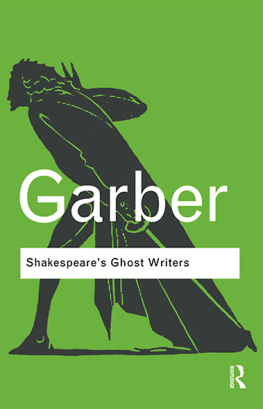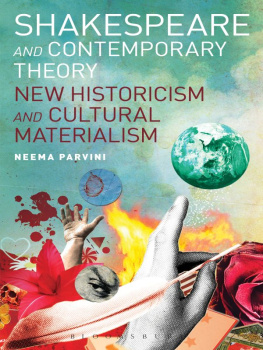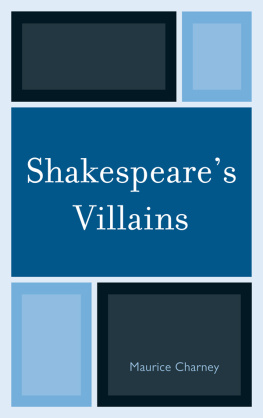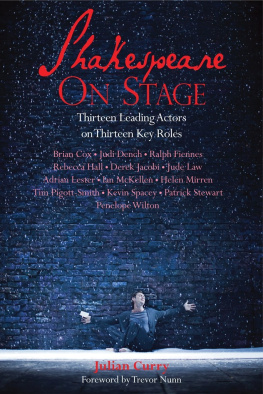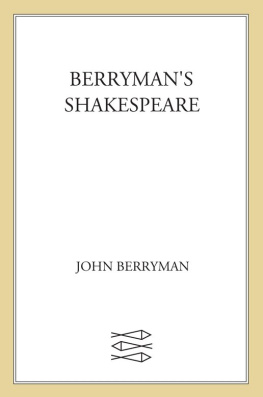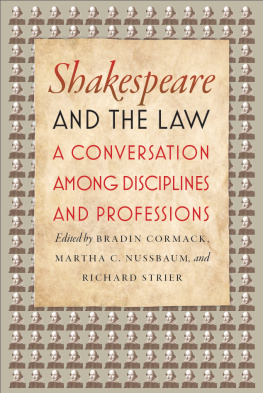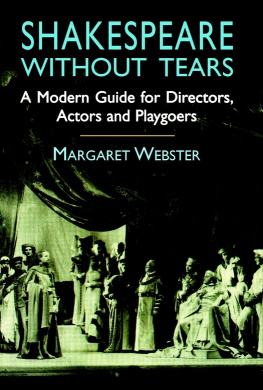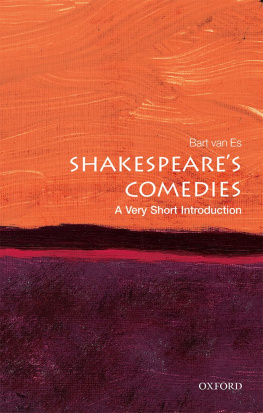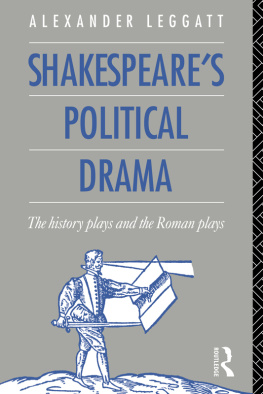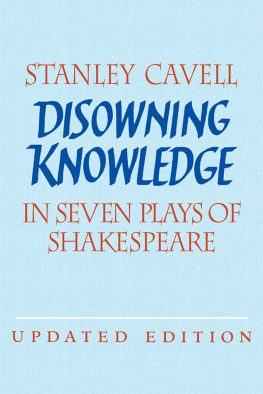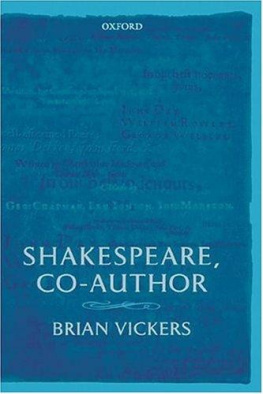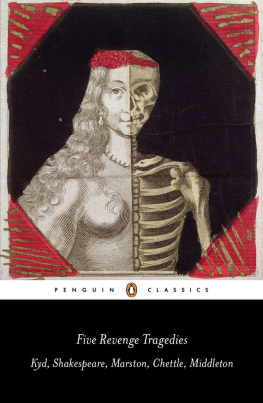Shakespeares Ghost Writers
Shakespeares Ghost Writersis a brave new book, for in justifying another book on Shakespeare, it has attempted nothing less than to make literature newly consequential.
Margreta de Grazia, Shakespeare Quarterly

Routledge Classics contains the very best of Routledge publishing over the past century or so, books that have, by popular consent, become established as classics in their field. Drawing on a fantastic heritage of innovative writing published by Routledge and its associated imprints, this series makes available in attractive, affordable form some of the most important works of modern times.
For a complete list of titles visit www.routledge.com/classics
Marjorie Garber
Shakespeares Ghost Writers
Literature as Uncanny Causality
With a new preface by the author

New York and London
First published in 1987
by Methuen, Inc
New York
First published in Routledge Classics 2010
by Routledge
270 Madison Avenue, New York, NY 10016
Simultaneously published in the UK
by Routledge
2 Park Square, Milton Park, Abingdon, Oxon OX14 4RN
Routledge is an imprint of the Taylor & Francis Group, an informa business
This edition published in the Taylor & Francis e-Library, 2010.
To purchase your own copy of this or any of Taylor & Francis or Routledges collection of thousands of eBooks please go to www.eBookstore.tandf.co.uk.
1987, 2010 Marjorie Garber
Chapter 7 A Tale of Three Hamlets first published in
Shakespeare Quarterly 61 (2010) 2855
All rights reserved. No part of this book may be reprinted
or reproduced or utilized in any form or by any electronic,
mechanical, or other means, now known or hereafter
invented, including photocopying and recording, or in
any information storage or retrieval system, without
permission in writing from the publishers.
British Library Cataloguing in Publication Data
A catalogue record for this book is available from the British Library
Library of Congress Cataloging in Publication Data
Garber, Marjorie B.
Shakespeares ghost writers : literature as uncanny causality / Marjorie Garber.
p. cm. (Routledge classics)
Includes bibliographical references and index.
1. Shakespeare, William, 15641616 Criticism and interpretation. 2. Shakespeare,
William, 15641616 Authorship. 3. Shakespeare, William, 15641616
Characters Ghosts. 4. Psychoanalysis and literature. 5. Drama Psychological
aspects. 6. Ghosts in lierature. I. Title.
PR2976.G37 2010
822.3'3 dc22
2010006490
ISBN 0-203-85711-9 Master e-book ISBN
ISBN 10: 0415875560 (pbk)
ISBN 10: 0203857119 (ebk)
ISBN 13: 9780415875561 (pbk)
ISBN 13: 9780203857113 (ebk)
For Rhoda and for Barbara
Who is the third who walks always beside you? When I count, there are only you and I together But when I look ahead up the white road There is always another one walking beside you Gliding wrapt in a brown mantle, hooded I do not know whether a man or a woman But who is that on the other side of you?
T. S. ELIOT, THE WASTE LAND
Nearly every man who loses a limb carries about with him a constant or inconstant phantom of the missing member, a sensory ghost of that much of himself, and sometimes a most inconvenient presence, faintly felt at times, but ready to be called up to his perception by a blow, a touch, or a change of wind.
S. WEIR MITCHELL, INJURIES OF NERVES
the phantom is meant to objectify, even if under the guise of individual or collective hallucinations, the gap that the concealment of some part of a loved ones life produced in us. The phantom is, therefore, also a metapsychological fact. Consequently, what haunts are not the dead, but the gaps left within us by the secrets of others.
NICOLAS ABRAHAM, NOTES ON THE PHANTOM
CONTENTS
ACKNOWLEDGMENTS
An earlier and briefer version of the chapter entitled Shakespeares ghost writers appeared in Cannibals, Witches and Divorce: Estranging the Renaissance, ed. Marjorie Garber, Selected Papers from the English Institute 1985 (Baltimore and London: Johns Hopkins University Press, 1987). I am grateful to the publisher for permission to reprint. I would also like to express my gratitude to the various audiences at the English Institute, the Modern Language Association, the Conference on Feminism and Psychoanalysis at Illinois State University, Dartmouth College, Haverford College, Mount Holyoke College, the University of Massachusetts, Yale University, Harvard University who have listened with care and patience to early versions of the arguments put forward in these pages. Their suggestions and criticisms have been invaluable.
My particular and heartfelt thanks go to Rebecca Monroe, who has worked tirelessly in preparing the manuscript copy, and whose perceptive comments and generous encouragement were not only welcome but, indeed, essential to the completion of this book. Janice Price and Bill Germano at Methuen have been immensely supportive and helpful. I owe thanks as well to Leonard Barkan, Deborah Carlin, Heather Dubrow, Margaret Ferguson, G. Evelyn Hutchinson, Rachel Jacoff, David Kastan, Arthur Kinney, Barbara Packer, Peter Stallybrass, Richard Strier, Nancy Vickers, and Carolyn Williams. To Shoshana Felman I am indebted for a whole way of reading. My most profound debt is to Barbara Johnson.
The lines from The Waste Land are reprinted by permission of Faber and Faber Ltd and Harcourt Brace Jovanovich from Collected Poems 19091962 by T. S. Eliot.
PREFACE TO THE ROUTLEDGE CLASSICS EDITION
Revenant (2010)
Lo, where it comes again!
Hamlet 1.1.128
A new preface to a previously published book is always something of a revenant, returning, belatedly yet insistently, to the scene. But to what scene does it return? The scene of the crime? The mise en scne? The other scene, Freuds useful term for the unconscious, the scene of action of dreams?
When I first wrote about the Shakespeare authorship controversy in the title essay of Shakespeares Ghost Writers in 1987, the topic seemed both fascinating and off-limits, a byway rather than a promising path for scholarship. At the time, the aficionados and adepts of this question were often regarded at least within the academy as amateurs, buffs, obsessionals and cranks, even though they numbered, in their ranks, such intriguing figures as Sigmund Freud World War I to finding the secret cipher in the plays of Shakespeare. In the year of Shakespeares Ghost Writers publication a mock trial on the authorship question was conducted by three justices of the United States Supreme Court.
More than twenty years later the Supreme Court again took up the question, with Justice John Paul Stevens, a participant in the earlier trial (and a one-time English graduate student) maintaining that the plays were written by Edward de Vere, the 17th Earl of Oxford. In this opinion he was joined by Justice Antonin Scalia, with whom he is in frequent disagreement about other matters that come before the Court. Two justices, Breyer and Kennedy, supported the claims of the man from Stratford, while others opted to cast no vote (Justice Ginsberg: No informed views; Justice Souter: No idea. Justices Roberts, Alioto, and Thomas declined to comment).

